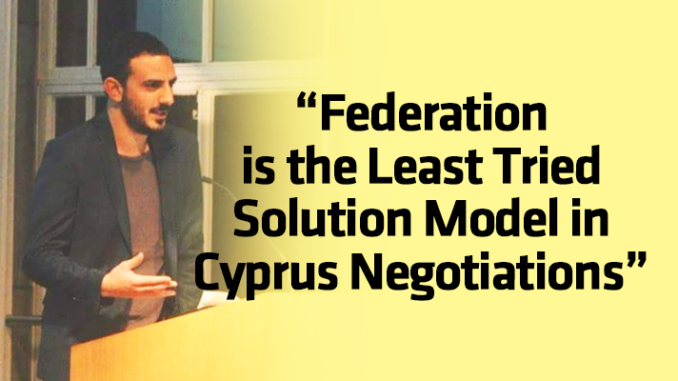
Founding Member of Independence Path; Celal Özkızan shared with his social media account that Minister of Foreign Affairs Özersay, accused President and negotiator Mustafa Akıncı as the supporter of the status quo. Also, Özkızan stated that the federation model was the least tried method in the history of the Cyprus problem.
Özkızan’s statement from his facebook account is as follow:
Özersay, Minister of Foreign Affairs of trnc, wrote that the federation has been discussed, tried and failed MANY TIMES. For this reason, he argued, “those who insist on the federation are the real status quoists” who do not want the situation in Cyprus to change.
Contrary to Özersay’s assertion, the federation is the LEAST TRIED solution model in the history of the Cyprus negotiations. Let’s explain why.
Turkish Cypriots have been represented by only 4 negotiators in total since 1968, when the negotiations ‘officially started’. From 1968 until 2005, our negotiator Rauf Denktaş, was not advocating federation but integration with Turkey. Where integration was not possible, his wish was ‘an independent’ Turkish state in Cyprus (trnc). From 2010 to 2015, our negotiator Derviş Eroğlu was also not a federationist. His intention and wish was to continue trnc and make it recognised. On the other hand, Talat and Akıncı, who served as president from 2005 to 2010 and from 2015 to the present, came to the negotiating task by the claim that they defend the federation. Even aside from my suspicions that Talat was defending the federation sincerely, the negotiators who said they were federationist, stayed on negotiator position for a total of 9 years. Opponents of the federation remained in the negotiator position for 42 years.
Since 1968, when the negotiations began ‘officially’, the Greek Cypriots were represented by a total of 7 negotiators. In the period 1968-1974, the line of Greek Cypriot leaders (president Makarios, negotiator Clerides) was even reluctant to grant minority rights to Turkish Cypriots. For this reason, they were not defending of the federation. Makarios was again the negotiator from 1974 to 1977. Kiprianu, who was a negotiator from 1977 to 1988, was a person who said ‘no’ to the Perez de Cuellar framework, which even Denktaş said yes. He was reluctant to take part in the negotiations to discuss the federation. It can be said that Kiprianu, who was a negotiator from 1988 to 1993, was defending the federation.
However, as the interlocutor of this period was Denktaş, the federation was not discussed sincerely at the table. In the first period (1993-1998) of the mission of Clerides, who served from 1993 to 2003, the federation was not even a matter of discussion. The only topic Clerides was putting his weight into was the accession of the Republic of Cyprus to the EU. Moreover, mortal conflicts at the border and the S-300 crisis were on the agenda at the time.
It can be said that Clerides defended the federation in his second period (1998-2003). His party DISI, was already the only party in the south to say yes to the Annan Plan. Papadopoulos, who served from 2003 to 2008, was anti-federationist, even an enemy of the Turks. Hristofyas, who served from 2008 to 2013, claimed that he was defending the federation. However, the Talat- Hristofyas negotiations (2008-2010) were passed through mutual accusations, not through a profound federation effort. In the last three years of Hristofyas’ negotiator position, his interlocutor was Eroğlu, who was not a federationist. Anastasiadis, who has continued his duty since 2013, has repeatedly expressed his thoughts and suggestions that are not related to the federation. To sum up, in the most optimistic terms (even if the periods of Kiprianu, Clerides’ second period and Hristofyas are calculated as federationists), 36 years of the 51-year negotiation process of the Greek Cypriots was carried out by the anti-federationists.
As if the fact that the federationists had found so little chance in the negotiation process was not enough, some of the negotiators who called themselves federationists on both sides did not even sincerely strive for the federation (example of the Talat- Hristofyas period). However, the anti-federationists of both sides have always done their best to undermine the federation during the negotiations. Moreover, we have only mentioned the ‘negotiators’ above, but the hegemons of the two sides, which have a serious power and influence over their own negotiators, have never defended the federation in any way.
In short, in Cyprus, the federation is least chance given, least tried, least effort spent, least claimed method. This is true for both sides, and there is not a single point to refute this situation, in the history of the negotiation or in the history of the Cyprus problem in general. I have no idea on what basis does Özersay, Minister of Foreign Affairs, say that the federation has failed despite the many attempts. You cannot say that “heart transplantation is not a solution” when you fail by constantly trying to make a lung transplant to someone who needs a heart transplant. The problem is you are a bad doctor. We want to heal, live beautiful lives. We do not need a bad doctor or a politician.


